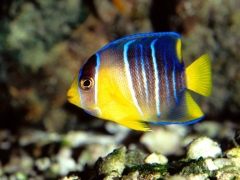Search the Community
Showing results for tags 'Blue angelfish'.
-
Scientific Name : Holacanthus bermudensis Reef Compatible : No Care Level : Intermediate Disposition : Semi-aggressive Min. Tank Size : 100 gallons Mature Size : 18 inches Diet : Omnivore Range : Western Atlantic The Blue Angelfish may also be referred to as the Common Angelfish. Similar to the Queen Angelfish, the Blue Angelfish has an overall aqua hue with a yellow shimmer and yellow edges on the fins and scales. The Blue Angelfish does not have the striking blue crown or other blue highlights of the Queen Angelfish. The juvenile Blue Angelfish differs markedly in coloring from the adult, with a yellowish-brown body color and pale blue striping. The Blue Angelfish requires a large aquarium of at least 250 gallons with plenty of hiding places. Tending towards aggression, especially directed at other angels, the Blue Angelfish is best kept as the only angelfish in the tank. Not a good reef dweller, the Blue Angelfish is prone to nip at stony and soft corals (sessile invertebrates) and clam mantles. It is hermaphroditic, very difficult to breed in an aquarium, and there are no distinguishing markings that differentiate males from females. The diet of the Blue Angelfish should include Spirulina, marine algae, high-quality angelfish preparations, mysis or frozen shrimp, other meaty items, and live rock for grazing. The Small Juvenile will contain the Juvenile colorations or may be color shifting to a young adult, while the Medium will be a sub-adult, and the Large will be in Adult coloration.
-
Scientific Name : Holacanthus bermudensis Reef Compatible : No Care Level : Intermediate Disposition : Semi-aggressive Min. Tank Size : 100 gallons Mature Size : 18 inches Diet : Omnivore Range : Western Atlantic The Blue Angelfish may also be referred to as the Common Angelfish. Similar to the Queen Angelfish, the Blue Angelfish has an overall aqua hue with a yellow shimmer and yellow edges on the fins and scales. The Blue Angelfish does not have the striking blue crown or other blue highlights of the Queen Angelfish. The juvenile Blue Angelfish differs markedly in coloring from the adult, with a yellowish-brown body color and pale blue striping. The Blue Angelfish requires a large aquarium of at least 250 gallons with plenty of hiding places. Tending towards aggression, especially directed at other angels, the Blue Angelfish is best kept as the only angelfish in the tank. Not a good reef dweller, the Blue Angelfish is prone to nip at stony and soft corals (sessile invertebrates) and clam mantles. It is hermaphroditic, very difficult to breed in an aquarium, and there are no distinguishing markings that differentiate males from females. The diet of the Blue Angelfish should include Spirulina, marine algae, high-quality angelfish preparations, mysis or frozen shrimp, other meaty items, and live rock for grazing. The Small Juvenile will contain the Juvenile colorations or may be color shifting to a young adult, while the Medium will be a sub-adult, and the Large will be in Adult coloration.



